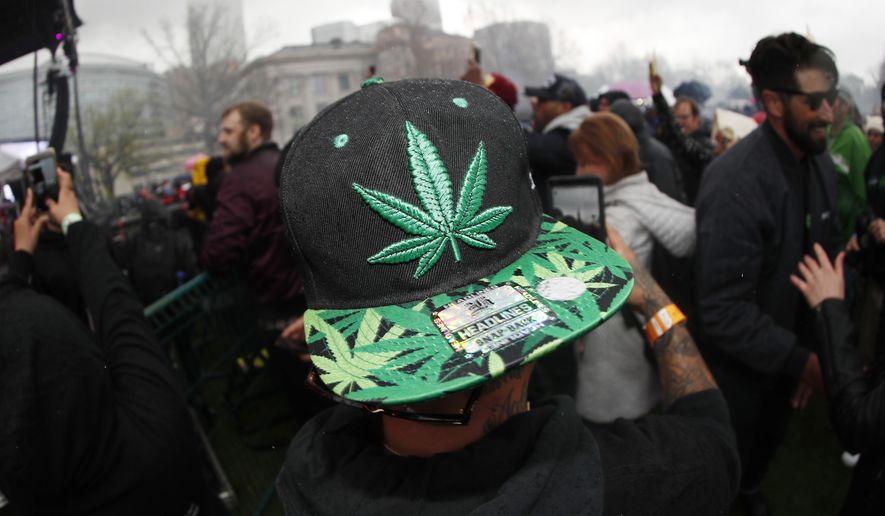Marijuana legislation is tied to a 25% increase in cannabis use disorder among teens, and the share of 12th-graders who vaped pot products nearly doubled from 2017 to 2021, according to a report released Thursday.
The pot industry is saturating minority communities with dispensaries, but only 4% of those reporting profits from selling marijuana products are people of color.
More than 800,000 marijuana-related emergency room visits were reported in 2021. That was nearly double the 455,000 recorded in 2011.
The steady march toward lenient marijuana laws is harming young people, minorities and other Americans, television personality and board-certified doctor Drew Pinsky said in a report drafted with Smart Approaches to Marijuana. This organization warns about the harms of marijuana use and is devoted to preventing “another Big Tobacco.”
The report said 52.5 million Americans used marijuana in 2021, up from 17.5 million in 1992.
The average concentration of THC in the marijuana flower has increased from 3.75% in 1995 to 15.8% in 2018. Dr. Pinsky said his practice is witnessing the consequences of the increased potency.
“We are seeing psychotic episodes at an extraordinary rate,” Dr. Pinsky said.
Dr. Pinsky, known for the radio show “Loveline” and television program “Celebrity Rehab With Dr. Drew,” presented the data with a roster of past and current lawmakers, drug policy officials and his daughter, Paulina Pinsky, at the Washington summit that coincided with April 20, or “4-20,” a date synonymous with marijuana use.
Ms. Pinsky said the issue is personal to her. She was hooked on pot but was 485 days sober as of Thursday.
“It’s funny being a marijuana addict because no one takes you seriously,” she said.
Former Rep. Patrick J. Kennedy, Rhode Island Democrat, said he cannot understand why the U.S. would legalize marijuana and run rampant ads for sports gambling and hard liquor while broader addiction and overdose rates remain unacceptably high.
“I see our country in denial,” Mr. Kennedy said. “We’re actually pouring gasoline on the fire.”
The summit served as a counterweight to the tide of politicians and industry players who said lax pot policies would advance social justice and equity without causing much societal harm.
Attitudes have changed swiftly over the past decade.
In 2012, Colorado and Washington became the first states to legalize recreational marijuana. Since then, 19 states and the District of Columbia have joined them, though approaches to sales vary.
Congressional Democrats have taken steps to legalize marijuana at the federal level.
Then-House Speaker Nancy Pelosi, California Democrat, called a legalization bill in April 2022 “one of the most important criminal justice reform bills in recent history.” President Biden moved last year to pardon people convicted of federal offenses related to simple possession of the drug.
A Pew Research Center survey last fall found that roughly 6 in 10 Americans believe marijuana should be legal for both medical and recreational use, 3 in 10 think it should be legal for medical use and 1 in 10 think it should not be legal in any form.
Advocates say marijuana is not as harmful as alcohol and should be on a level playing field with booze. Others point to revenue from sales or say it is a serious matter of equality because convictions for marijuana possession affect too many minorities.
“Today is the start of an entirely new industry for our state and a historic moment in our work to advance social and economic justice,” New Jersey Gov. Phil Murphy, a Democrat, said last year while launching voter-approved marijuana dispensaries in the state.
The Smart Approaches to Marijuana report said the promises of legalization often don’t match reality.
Emergency room visits and hospital admissions for marijuana abuse have risen 89% since California legalized the drug. Colorado has reported a 46% increase in hospitalizations because of a condition known as cannabis-related hyperemesis — prolonged and cyclical vomiting — “in just five years after the legalization of recreational cannabis,” the report said.
In Virginia, 6 in 10 regular marijuana users reported driving while under the influence of pot in recent months, and roughly a quarter reported driving under the influence of the drug at least once a week.
The report said marijuana dispensaries are often set up in minority neighborhoods while owners rake in profits elsewhere. It said the industry is “largely bereft of diversity,” with only one minority-owned dispensary in Illinois in 2022.
“Many people have bought the marijuana industry’s line that their products weren’t addictive or dangerous and could actually help communities of color. Now, the data is in to prove it was a lie,” said Smart Approaches to Marijuana President Kevin Sabet, who worked as a drug policy adviser to Presidents Clinton, Bush and Obama.
Keith Humphreys, a Stanford University professor who tracks drug issues and was not involved in the report, agreed that the financial benefits of cannabis legalization “have not been shared with oppressed communities.”
“Many of the corporate representatives and investors who made the social justice argument were not sincere. They just wanted the money, and now they are getting it,” he said.
Sen. Pete Ricketts, Nebraska Republican, said the nation usually relies on the Food and Drug Administration to vet drugs and determine their effects and safety, yet the pot industry is seeking big profits and doesn’t want to be constrained.
“This is about a business,” Mr. Ricketts said. “They want to have a business that is not regulated.”
As a result, he said, chronic use leads some young people to consider suicide or engage in risky behavior, including impaired driving.
“These are the consequences of having legalization of marijuana,” Mr. Ricketts said. “People are waking up to how dangerous this drug actually is.”
• Tom Howell Jr. can be reached at thowell@washingtontimes.com.




Please read our comment policy before commenting.